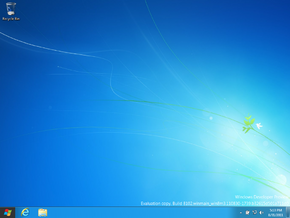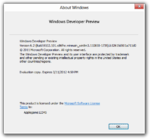User:Pivotman319/Sandbox/8102.101
| Build of Windows 8 | |
 | |
| Release name | Developer Preview Milestone 3 |
|---|---|
| OS family | Windows NT |
| Version number | 6.2 |
| Build number | 8102 |
| Build revision | 101 |
| Architecture | x86, x64, ARM32 (ARMv7) |
| Build lab | winmain_win8m3 |
| Compiled on | 2011-08-30 |
| Expiration date | |
| Timebomb | 2012-03-11 (+194 days) |
| SKUs | |
Developer Preview (Prerelease) | |
| Product key | |
| 6RH4V-HNTWC-JQKG8-RFR3R-36498 | |
| About dialog | |
Windows 8 build 8102.101 is the official Developer Preview and Milestone 3 build of Windows 8. It was released to application developers on 13 September 2011 in tandem with the debut of the Microsoft Build conference,[1][2] a merger of the Professional Developers Conference and the MIX conferences, held between 13 and 16 September.
The build was officially released for the x86 and x64 architectures only in the English (United States) language, as much of the existing Metro UI resources (including shell-related strings) were deliberately hardcoded into the main Redpill shell library (shsxs.dll). Its respective Simplified Chinese language packs were leaked by Chinese website cnBeta on 20 September 2011, exactly one week after the build's public release.[3]
A version of the build, which ran on a modified x86-based Samsung Series 7 Slate tablet PC featuring an additional set of sensors, was also distributed to event attendees. The x64 release was further complemented by a separate variant that contained additional development tools, which includes preview builds of Visual Studio 2012 Express, the Windows Software Development Kit and Blend for Visual Studio.
It is notably the only available build to come with the Redpill feature set unlocked out-of-box via the official unlock procedure, therefore having the complete Windows 8 user interface enabled by default. It is also the first available build to come with the full set of pre-installed Metro applications, although the included application set mostly consists of demonstrations for various API capabilities exposed within the operating system.
Components related to the ARMv7 compile of this build were discovered on the Microsoft Symbol Server on 21 May 2022.
Redpill[edit | edit source]
This is the first publicly released build of Windows 8 to have all new Metro features working out-of-box. While the image that was distributed by Microsoft has the modernized shell enabled, it still utilizes the same internal mechanism of (un)locking Metro features through Redpill as seen in earlier builds. A remnant from the Redpill application is present in this build in the form of a redpill.log file in the Windows\System32 directory, giving some insight to the functioning of the official Redpill unlocker.
The contents of the file are listed below:
redpill.log:
Running with /labuseonly Running with /restrictedlab Running with /privatebinary Overriding version check... Installing licenses... Setting IE activesetup stub Setting MIE install state... Checking MIE package state... Restarting sessionenv... Setting IE activesetup stub ERROR: Binary version mismatch! Enabling via /enable Setting MIE install state... Checking MIE package state... Preparing to install immersive browser... Installing MIE OOB... Installing MIE complete. Return code: 0 Finished installing MIE OOB. Restarting sessionenv... Setting IE activesetup stub NoExplorer flag set; skipping explorer restart
As the build was intended to be distributed en masse, the Redpill product policies installed in this build's OS image (RP01-PDC) are only applicable to the Developer Preview and Datacenter Server SKUs. A non-SKU-limited version of the Redpill policies also exist, simply labeled RP01.
Because of the similarities in the way of how features are locked between this build and some earlier builds, the files dropped by the relevant Redpill tool have been used to unlock Windows 8 shell features in several older builds including but not limited to 8056 (fbl_grfx_dev1), 7989, and 7927.
To showcase the abilities of the new Windows 8 user interface, the build includes a set of sample applications that take advantage of various existing Windows Runtime functions.
Disabling Redpill[edit | edit source]
Setting SOFTWARE\Microsoft\Windows\CurrentVersion\Explorer\RPEnabled to 0 in the HKEY_CURRENT_USER and HKEY_LOCAL_MACHINE root keys will disable all Metro features, effectively un-redpilling the build resulting in an experience similar to earlier leaked builds of Windows 8 and by extension Windows 7 after a system restart. Special applications were created to suffice for this need.
New features and changes[edit | edit source]
Desktop UI[edit | edit source]
Inbox Windows games[edit | edit source]
The built-in games from Windows Vista and Windows 7 have been removed from the Developer Preview SKU (Prerelease) and its ARMv7 counterpart (PrereleaseARM).
Control Panel[edit | edit source]
Devices and Printers[edit | edit source]
The Devices and Printers Control Panel applet no longer prompts the user to enable downloading additional Device Stage metadata over the Internet.
Windows CardSpace removal[edit | edit source]
The Windows CardSpace applet has been removed from the operating system as it has been superseded by the newer Credential Manager Control Panel applet, first introduced in Windows 7. It is there no longer possible to store personal or enterprise-managed credentials through this method.
Windows Extended theme[edit | edit source]
A new "Windows Extended" theme has been added to help showcase multi-monitor support capabilities.
Miscellaneous[edit | edit source]
- All region-specific themes included as part of Windows 7, as well as Internet Explorer region-specific links for favorites and RSS feeds, have been removed from the operating system.
- A no-warranty disclaimer for Samsung Series 7 Slate tablet PCs has been added to the Contact Support page found within the Help and Support Center.
Metro UI[edit | edit source]
Charms[edit | edit source]
The Start charms menu's animation has been updated to fade into view when hovering over its respective hot-corner, rather than sliding from the bottom. The Connect charm was renamed to Devices and no longer prompts the user about compatible Send applications when attempting to project to other displays.
Start screen[edit | edit source]
The default Start screen layout has been updated to no longer include common Win32 desktop applications, and now only includes Internet Explorer, Windows Store, Windows Explorer, and the Immersive Control Panel applications as the default pinned tiles, in addition to the "Switch to Desktop" tile.
Semantic view mode on the Start screen has been temporarily disabled.
Inbox applications[edit | edit source]
Multiple inbox system applications, namely the Internet Explorer, Immersive Control Panel, Remote Desktop Connection, Windows Store, have had their pinned Start screen tiles redesigned and recolored to shades of light blue, yellow and orange, respectively.
Context menus in the tablet-optimized Internet Explorer 10 user interface have been resized to fit all possible options.
The Windows Store has been forcibly disabled in this build as the underlying platform was not yet ready for public use. A "coming soon" message is instead displayed to the user when launched, although all relevant code for the Windows Store is still present in the application.
Boot UI redesigns[edit | edit source]
The redesigned Windows Boot Manager and Windows Recovery Environment user interfaces are now enabled by default (value 1; Standard). This functionality is controlled by Boot Configuration Data (BCD) OS loader boolean variable BCDE_OSLOADER_TYPE_BOOT_MENU_POLICY (BOOTMENUPOLICY; 0x250000c2), which controls enablement of the new Windows 8 boot UI behavior.
The redesigns may be turned off by setting the value of the aforementioned variable to 0 (Legacy).
Miscellaneous[edit | edit source]
Sizing adjustments towards Metro dialog modals have been implemented to allow more content to fit properly, and text in dialog modals are now colored properly when drawn in the desktop view.
Miscellaneous[edit | edit source]
- Third-party root certificates for DigiCert Assured ID Root CA and GTE CyberTrust Global Root have been added to the system.
- The end-user license agreement has been updated for the public Developer Preview release.
Bugs and quirks[edit | edit source]
Installation[edit | edit source]
- Upgrades to this build have been disabled by default as it is intended to be a preview release; this behavior is controlled by the presence of an empty
noupgrade.txttext document in thesourcesdirectory. It can be re-enabled by removing the binary from the installation media.
Desktop Window Manager[edit | edit source]
- Applications that make use of the DWM extended client area will only properly render translucency effects for 3/4ths of the visible area.
- Switching to a High Contrast theme and then switching back to Aero or Aero Lite might result in a fully transparent taskbar. The navigation bar may also appear black.
- Running
WindowsAnytimeUpgradeResults.exewith the Aero Lite theme applied will forcibly enable DWM blur effects.
Updates[edit | edit source]
A number of updates were released throughout the Developer Preview's lifespan:
8102.101.winmain_win8m3.110830-1739(KB2608610) - installed by default8102.105.winmain_win8m3.110907-1505(KB2616619)8102.106.winmain_win8m3.110908-1424(KB2616150)8102.108.winmain_win8m3.110911-1502(KB2617028)8102.109.winmain_win8m3.110912-1733(KB2617868)- Additionally demonstrated during several Build 2011 sessions[4]
8102.110.winmain_win8m3.110913-1848(KB2618032)8102.112.winmain_win8m3.110915-1505(KB2619246)
Uninstalling the KB2608610 update will revert the OS kernel to build 8102.0.winmain_win8m3.110823-1455.
Gallery[edit | edit source]
Windows Setup[edit | edit source]
Out-of-box experience[edit | edit source]
Themes[edit | edit source]
Aero Lite theme
DWM glitches[edit | edit source]
Redpill disabled[edit | edit source]
Out-of-box experience[edit | edit source]
ARM32 version (unleaked)[edit | edit source]
References[edit | edit source]
- ↑ Microsoft. Microsoft Reimagines Windows, Presents Windows 8 Developer Preview, Microsoft News. 13 September 2011.
- ↑ Sinofsky, Steven. Welcome to Windows 8 – The Developer Preview, Building Windows 8. 13 September 2011.
- ↑ [图+下载]Windows 8 开发者预览版中文包[更新x86/x64], cnBeta. 20 September 2011. Archived from the original on 23 September 2011.
- ↑ A deep dive into Visual Studio 11 Express for designing Metro style apps using XAML | BUILD2011. Channel 9. 15 September 2011. (Wayback Machine / Video)











































